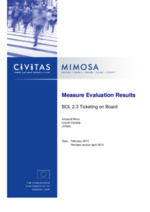On-board ticketing
Summary
Bologna has introduced a new electronic ticketing system that integrates bus and train services started in January 2010. Thanks to this new system, a solution for ticketing on board that uses the on board computer and validator already installed on buses was implemented.
Implementing sustainable mobility
With this measure a solution for on board ticket issue for suburban buses was developed. Before the Mimosa project only urban buses were provided with self-service ticket vending machines on baord. This solution is not practicable for suburban buses because it is unadvisable to have money in strongboxes on buses which might remain out of the depots all night.
Thanks to the development of the new electronic ticketing system that started in Bologna on 1st January 2010, a solution for ticketing on board that uses the on board computer and validator already installed on buses was implemented. The new system allows the driver to issue tickets by means of an on-board computer selecting the requested tariff, coding a virgin magnetic ticket and validating it; the driver receives money from PT users.
The main objectives of this measure are to:
- Increase the quality of extra-urban public transport services; and
- Increase extra-urban public transport use.
Progress
Bologna has developed a prototype ticketing machine to test the software under laboratory conditions. In May 2011, the city started testing the system on an extra-urban bus. In May 2012, the first version of the software was defined, based on intensive feedback from bus drivers. A further request came from drivers to allow for the last ticket issued to be annulled: to include this functionality a second software release was issued in June 2012. During June 2012 training activities started with a 3-hour training course for 9 drivers. The course was made up of a general presentation of the system and a test run of issuing tickets.
Starting on 1st July 2012 the system was deployed on 3 suburban lines (686, 576, 537) and from 22 October 2012 the service has been activated on all suburban lines.
During September and October 2012, training courses that took place in the bus depots in Bologna and the province, were extended to all drivers of the suburban service. At the end of the courses about 600 drivers had been trained.
Users’ acceptance is difficult to be measured through direct interviews since tickets are purchased on-board by occasional customers. To overcome this problem and better evaluate the social aspects of the new ticketing service, a survey in October 2012 was carried out with 50 bus drivers on the first 3 activated bus lines to collect their feedback on the system and their perception of users’ acceptance. From both viewpoints feedback was very positive.
The main barriers to overcome was the additional pay requested by drivers to issue the tickets as they consider it to be a supplementary duty for them. To implement the on-board ticketing system, an agreement with the Trade Unions was concluded that foresees a payment to the driver of 30% of the total value of tickets issued. Tickets on-board have a higher price and this mark-up mostly goes to the drivers.
The system does not increase operative costs for the hardware because it uses existing devices already installed on-board. The only maintenance cost concerns the software and can be quantified at 5,000.00 euro/year.
Outcomes
With this measure a solution for on board ticket issue for suburban buses was developed through the realization of a system for magnetic ticket issue on board. This new service allows passengers to buy tickets on board on the whole bus fleet. Then the quality of public transport service has increased in terms of accessibility. A survey to drivers gave very positive feedbacks on the system both from organisational and users acceptance aspects.








